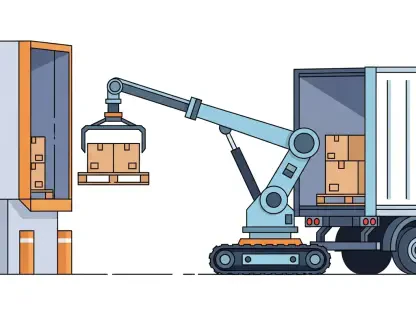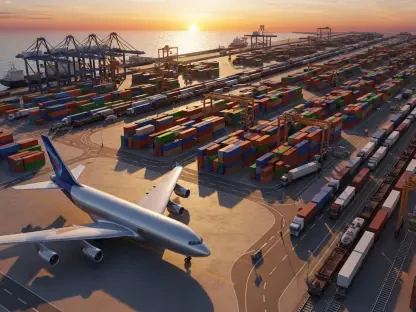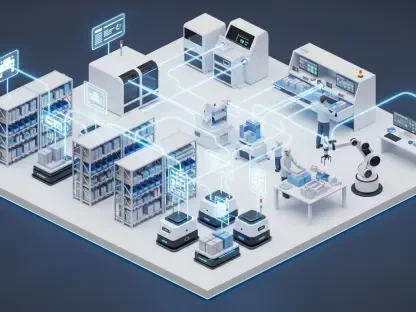Artificial Intelligence (AI) has ushered in a transformative era for the freight brokerage industry, fundamentally altering the landscape through enhanced operational efficiency and innovative problem-solving techniques. This market analysis delves into how AI is reshaping freight brokerage by examining specific trends, current data, and projecting future advancements. With numerous AI-driven solutions presented at industry conferences, the importance of strategic adoption and continuous evolution is highlighted.
Unveiling AI’s Pivotal Role in Freight Brokerage
The freight brokerage industry has long sought ways to improve efficiency and accuracy, transitioning from paper-based systems to digital solutions over recent years. The adoption of AI marks the latest significant breakthrough, driving a sea change in operations and service delivery. At conferences like the Transportation Intermediaries Association’s (TIA) annual Capital Ideas Conference, both established companies and emerging startups showcased AI innovations aimed at addressing key logistics challenges. This analysis provides an in-depth look at the prevalent trends and emerging technologies that are shaping the market today.
Market Trends and Analysis
Automating Communication Management
A major trend is the automation of communication management. AI solutions, such as those developed by CloneOps AI, streamline responses to the multitude of emails, texts, and phone calls brokers deal with daily. CloneOps AI’s voice identification feature enhances security by verifying caller authenticity, setting elevated standards in operational reliability and fraud prevention. This automation decreases manual workload, allowing brokers to concentrate on strategic tasks, thereby boosting overall efficiency significantly.
Revolutionizing Capacity Management
Capacity management has seen substantial improvements through AI technology. Parade employs AI to collect and evaluate carrier data, aiding brokers in securing truck capacity more efficiently. Natural language processing employed by Parade organizes incoming carrier information, ensuring a seamless match between available trucks and service needs. This not only reduces the manual labor involved but also enhances the speed and precision of capacity management, showcasing AI’s transformative power in logistics operations.
Specialized AI Applications
AI presents specialized applications tailored to niche areas within logistics. For example, Qued and Revenova focus on specific challenges like appointment scheduling and customized AI agents for brokers. Qued coordinates various communication channels to streamline scheduling processes, while Revenova’s AI agents cater to distinct operational needs, offering bespoke solutions that optimize productivity. These innovations highlight how AI can address unique pain points, thereby enhancing overall operational efficiency.
Future Projections
Financial Solutions and Predictive Pricing
Looking forward, AI’s role in financial solutions and predictive pricing is deemed pivotal. OTR Solutions’ OTR365 network ensures continuous driver payments and cash flow, exemplifying AI’s capability to resolve financial bottlenecks. Predictive tools like those from Greenscreens.ai and Get Real Rates leverage AI to forecast market trends and pricing, equipping brokers with sharp market insights and competitive pricing strategies. Such innovation is set to elevate the precision and efficiency of financial operations within the freight brokerage industry.
AI in Talent Management and Fraud Prevention
AI’s application in talent management with platforms such as Lean Solutions’ StudioQ streamlines hiring processes and improves onboarding efficiency. StudioQ employs AI to provide visibility and facilitate seamless integration of new hires. Meanwhile, Highway’s visibility solution, blending tracking and security validation, combats fraud effectively, emphasizing AI’s role in enhancing operational reliability.
Strategic Insights and Recommendations
Adopting AI-driven solutions offers tangible benefits for freight brokers. Integrating automated tools for routine tasks like order entries and tracking can significantly alleviate manual burdens. Leveraging advanced security measures and staying informed about emerging AI trends is crucial. Continual investment in AI technologies will enable brokers to harness the evolving capabilities of these innovations, ensuring sustained success in adapting to the dynamic market landscape.
Reflecting on AI’s Long-Term Significance
The long-term impact of AI on the freight brokerage industry has proven to be profound. AI-driven advancements have redefined operational efficiencies, bolstered security, and addressed specific industry challenges. As technology continues to advance, its role in logistics will expand further, offering increasingly innovative solutions. The ability of freight brokerage firms to adapt and leverage AI will determine their success in creating smarter, more efficient, and secure operations. Embracing AI positions brokers not only to meet current demands but also prepares them for future developments within the rapidly progressing logistics sector.









